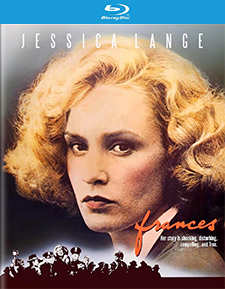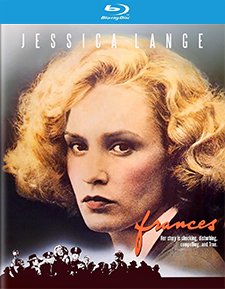Frances (Blu-ray Review)

Director
Graeme CliffordRelease Date(s)
1982 (February 18, 2025)Studio(s)
EMI Films/Brooksfilms/Universal Pictures (Kino Lorber Studio Classics)- Film/Program Grade: A
- Video Grade: A-
- Audio Grade: A
- Extras Grade: A
Review
Frances Farmer was an actress whose career spanned three decades. She secured a studio contract but after a few years became disillusioned with the shallowness and artificiality of Hollywood and abandoned what was a burgeoning career. These days, she’s best remembered for the harrowing treatment she suffered in mental institutions. Her story is told in the biopic called, simply, Frances.
When we first meet Frances Farmer (Jessica Lange, Tootsie), she’s a Seattle high school essay contest winner reading her controversial paper to a shocked audience. This is our first glimpse of the rebellious spirit that would become her Achilles heel. A talented and attractive actress, she heads for Hollywood in the midst of the Great Depression and is offered a contract with Paramount Pictures. Of course, she accepts this rare opportunity, but the studio’s attempts to mold her to its ideal of a movie star infuriate her. She fights with the bosses and drinks heavily.
Determined not to be pigeonholed, Frances heads to the New York theater scene, where she’s attracted to the left-wing ideas of the Group Theater and develops a relationship with one of its writers, Clifford Odets (Jeffrey DeMunn, The Green Mile). Frances’s mother, Lillian (Kim Stanley, The Right Stuff), who has been reveling in the reflected glory of her daughter’s success, pressures Frances to abandon theater and return to Paramount.
Trying to break free of both the starlet stereotype and the demands of her controlling mother, Frances takes a self-destructive path. Her unruly behavior lead to arrest on charges of assault and battery. Lillian is named her legal guardian, allowing her to make decisions about Frances’ care and medical treatment, and commits her to a mental institution, where she’s treated according to the barbaric standards of the era. She’s injected with sedatives, emerged in ice baths, straitjacketed, put into a padded cell, given shock treatments, and ultimately subjected to a transorbital lobotomy, in which a needle-like device is inserted through the eye socket.
As biopics go, Frances can be terribly depressing. It chronicles the very brief rise to prominence of a bright, outspoken young woman and her lengthy journey into despair as her self-assurance and spirited identity are gradually erased. The film makes clear in its final credits that contemporary mental health treatment—even by the standards of 1982, when the film was made—is a far cry from those of the 1940s depicted in the film.
Lange does a solid job of capturing both the young, shy Frances and the increasingly aggressive movie star she becomes. Her manner of speaking is slow and gentle, even when confronting her mother. When she later struggles and screams at the indignities thrust on her, the rage is quite a contrast. She conveys numerous layers of a complex personality, and isn’t content to turn in a one-note performance. Lange resembles Farmer physically, as well, and her hairdos, make-up, and costumes complement her ability to channel the troubled actress.
As Lillian Farmer, Stanley, too, is multi-faceted. Director Graeme Clifford resists painting the character with a broad brush. Rather than portray her as the villain, Stanley plays Lillian as a concerned, if conflicted, mother who makes bad decisions based on bad advice. She’s always there for Frances, even when Frances wants to distance herself. Stanley’s body language is very revealing. Should she embrace Frances or keep her at arm’s length? We see in Stanley’s eyes a combination of confusion, love, and pity, making her performance more about a woman than a monster. That she was ultimately complicit in the studio’s and the mental hospitals’ treatment of her daughter is an ironic thread running through the film.
There are strong supporting performances by Sam Shepard (August, Osage County) as Harry York, a man who weaves in and out of Frances’ life in good times and bad; Lane Smith (My Cousin Vinny) as Dr. Symington, the officious head of a sanitarium; Darrell Larson (The China Syndrome) as a spy for Louella Parsons pretending to be a fan; Jordan Charney (Ghostbusters) as Group Theater producer Harold Clurman; James Karen (Mulholland Drive) as a judge; and Gerald S. O’Loughlin (Twilight’s Last Gleaming) as creepy lobotomy doctor. If you look closely and quickly, you can see Anjelica Huston among a group of mental patients.
Frances is unforgettable, mostly because of Lange’s committed performance. The story is told objectively, without making Frances a saint or going to undue extremes. The facts themselves are highly dramatic and tragic, and the story goes beyond episodes in the life of an actress of a bygone era. We come away realizing how gruesome and even barbaric mental hospitals—or asylums, as they were called—caused great harm in the name of curing patients. Frances is a gripping saga of a woman whose voice was silenced by maternal and medical arrogance.
Frances was shot by director of photography Laszlo Kovacs on 35 mm film with Panavision Panaflex cameras and Panavision lenses, finished photochemically, and presented in the aspect ratio of 1.85:1. There’s no mention of source material for the Blu-ray, though it does nicely simulate the theatrical experience. Kovacs’ cinematography is quite lovely, often approximating styles common in the 1930s and 40s—flattering backlighting, glowing key light on Lange’s face, nice sense of depth, and harsh lighting in police station and asylum scenes. Details are nicely delineated. Color palette varies from bright primary hues to darker tones, mostly as Frances’ fortunes nosedive. Occasionally, a close-up will show Frances lit from the side, so that part of her face is in shadow. This gives her an alluring, mysterious quality. John Barry’s score, highlighted by harmonica, has a sad, mournful quality that’s a perfect accompaniment for the story of a woman’s descent into despair. Enhanced sound effects include birds chirping, droplets of rain splashing into a puddle, and a cracking fireplace fire.
The soundtrack is English 2.0 DTS-HD Master Audio. English subtitles are an available option. Dialogue is clear and distinct. Lange speaks softly in most scenes and screams and rages when her character is restrained by police and hospital personnel.
Bonus materials on the Region A Blu-ray release from Kino Lorber Studio Classics include the following:
- Audio Commentary by David De Valle and Dan Marino
- Audio Commentary by Graeme Clifford and David Gregory
- A Hollywood Life: Remembering Frances (30:54)
- Trailer (2:17)
- Music Box Trailer (1:21)
- Country Trailer (2:01)
- A Thousand Acres Trailer (2:09)
- Broken Flowers Trailer (2:06)
- Raggedy Man Trailer (2:34)
- Hollywoodland Trailer (2:09)
- Valentino Trailer (3:04)
- Daisy Miller Trailer (3:30)
Commentary #1 – Film historian David Del Valle and film historian/producer Dan Marino provide a thoroughly researched commentary on the film Frances and the life and career of its subject, Frances Farmer. They say the film provides a “compartmentalized view” of Farmer, who has risen to the status of cult figure. She did and said whatever she wanted and was honest about her beliefs. Seattle was a hotbed of political activity when Farmer grew up in the city. The film is a “unique take on the biopic.” Sam Shepard’s character is largely fictional but based loosely on a real person. There’s great screen chemistry between Lange and Shepard. The commentators discuss Shadowland, a book about Farmer. They believe Lange’s performance as Farmer is the best of her career. She gives a sense of who Farmer really was. In actuality, Farmer was even more politically active and outspoken than depicted in the film. She admired the Moscow Art Theater because of its purity. The commentators provide details of Farmer’s pre-Hollywood life not covered in the film. It’s often necessary for a film to adapt facts. Paramount, Farmer’s home studio, was known for bringing plays to Hollywood for adaptation. Farmer did the opposite. She had success in Hollywood and then went to New York to act on the stage. She fell really hard for Clifford Odets, whose plays were “of their time.”
Commentary #2 – Director Graeme Clifford notes that Frances was his first feature film. Mel Brooks helped secure financing. Location scouting was done in areas where Farmer grew up to achieve authenticity of the period. Farmer’s mother was a social climber and stage mother living vicariously through her daughter’s success. Sam Shepard plays the enigmatic character of Harry York, who appears throughout Farmer’s life, a device used as a door into the film’s subject. As depicted in the film, Farmer longed for her father to stand up on her behalf to his strong-willed wife. The mother didn’t know when to back off. Farmer’s lack of diplomacy was one element contributing to her downfall. Kevin Costner appears briefly as a Group Theater actor and got his SAG card for the part. The film had a 12-13 week shooting schedule. Filming was done in Seattle first. Then the company moved to Los Angeles for stage work. The set wasn’t especially “emotionally charged.” Clifford describes how he assembled key crew members and says, “nothing is more important in filmmaking than preparation.” He believes an extra week of preparation is relatively cheap and pays off in the final production. Clifford speaks about the first scene he shot for the picture—a scene between Lange and Shepard. The creator of the transorbital lobotomy depicted in the film was a self-promoter who felt he was doing good. The film captures the inner soul of Frances, according to Clifford, who considers himself lucky to have made such a compelling film as his first feature.
A Hollywood Life: Remembering Frances – Actress Jessica Lange notes about Frances Farmer, “She just couldn’t play the game.” Stars back in the 1930s and 40s were managed by the studios. Frances Farmer was chosen to be groomed. She couldn’t back off. You had to be emotionally stable to work within the studio system. Drinking exacerbated her problems. She wanted to do serious work and felt her talents weren’t properly exploited. For director Graeme Clifford, Frances was a passion. Before Frances, Jessica Lange had been in only two movies. Kim Stanley was teaching acting at the time but was intrigued by the character of Lillian Farmer and accepted the role. Mental institutions at the time were “hellholes.” Conditions and treatments are greatly improved nowadays. Because Farmer was headstrong, she was conveniently labeled insane. The transorbital lobotomy was a quick procedure, “a bed-saving device” for hospitals. Both Jessica Lange and Kim Stanley were nominated for Academy Awards. Frances didn’t do that well on its original release but developed a following when it was released on home video and was seen by a larger audience. Referring to Farmer, Lange reveals that she “missed her presence” in her life when filming was completed.
Frances Farmer’s destruction can be attributed to a number of causes: an aggressive personality, the studio system, an overbearing mother, alcoholism, and psychiatric malpractice. The combination of these elements caused her to spiral into a dark emotional abyss. Frances illustrates how an opinionated, honest person can be subjugated and controlled by well-meaning but misguided people and institutions.
- Dennis Seuling

